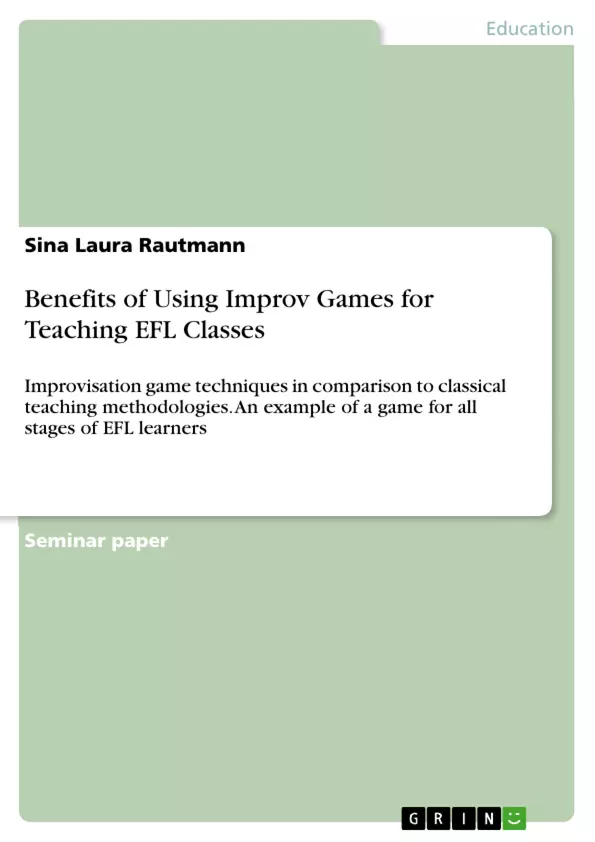Improvisation is in human nature. We improvise frequently when we have to solve problems in every day life, react to unforeseeable events, and communicate with others, especially through spoken language. Communicative competences are the key to speaking a language. Fluency plays an important role in communication. While as teachers it is our goal to enable our pupils to communicate in the new language, we are free in the choice of methods with which we want to accomplish this goal.
Overall, classroom games and drama teaching are widely explored in literature from the mid 20th century until today and positive effects on learning and teaching have been reported. However, the mixed form of “improv games” did not receive much attention and therefore still leaves room for further investigation.
Successful communication requires “turn-taking”-skills. These can be trained through improv games because turn-taking is an essential mechanism of improv. Two or more players interact with each other, reacting to expressions and comments, posing questions or solve a task together. The following sections give an insight into what improv games are, how they work and whether they should be used in teaching for different levels of language classes. They key features will be compared to classic teaching methodologies to see how they can integrate into or enhance given techniques.
For easy reading I have alternated the use of male and female pronouns, although every he and she includes both genders, if not explicitly stated to be gender specific.
Inhaltsverzeichnis (Table of Contents)
- 1 Introduction
- 2 Methodology – What is Improv and What are the Benefits?
- 2.1 What is Impov?
- 2.2 History of Improvisation
- 2.3 Rules of Improv Games
- 2.4 Personal Benefits from Improv Games
- 2.5 Social Benefits for a better classroom atmosphere
- 2.6 Using Improv Games for Teaching English
- 2.6.1 Train Listening and Speaking Skills
- 2.6.2 Trigger Competition as a Motivation
- 2.7 Connection to Different Teaching Methods
- 3 Analysis – The Game 'What are you doing?' for ELT Classes
- 4 Conclusion
- 5 Works Cited and Additional Resources
Zielsetzung und Themenschwerpunkte (Objectives and Key Themes)
This term paper examines the benefits of incorporating improvisation games into English as a Foreign Language (EFL) classrooms. It analyzes the techniques of improvisation games in comparison to traditional teaching methodologies and provides an example game suitable for all stages of EFL learners.
- The importance of communicative competence in EFL teaching.
- The role of improv games in developing communicative skills such as listening, speaking, and turn-taking.
- The benefits of improv games for building a positive classroom atmosphere and fostering teamwork.
- The connection between improv games and various teaching methods.
- The application of improv games to different levels of EFL learners.
Zusammenfassung der Kapitel (Chapter Summaries)
- Chapter 1 introduces the concept of improvisation in daily life and its relevance to language learning. It highlights the importance of communicative competence and the role of fluency in achieving effective communication. The chapter also underscores the potential of improv games in developing communicative skills, particularly turn-taking.
- Chapter 2 delves into the nature of improv, exploring its historical origins and key features. It outlines the rules and principles of improv games, emphasizing their emphasis on spontaneity, teamwork, and creative expression. The chapter also examines the personal and social benefits of improv games, arguing for their potential to enhance learning, build confidence, and foster positive classroom dynamics.
- Chapter 3 explores the application of improv games to teaching English. It examines the effectiveness of improv in training listening and speaking skills and highlights the motivational aspects of competitive elements within improv games. This chapter also connects improv games to different teaching methodologies, demonstrating their adaptability and potential for integration into existing classroom practices.
Schlüsselwörter (Keywords)
This paper focuses on the application of improv games for EFL teaching. Key areas of investigation include: communicative competence, fluency, improvisation, turn-taking skills, classroom atmosphere, teamwork, teaching methodologies, EFL learners, and game-based learning.
Frequently Asked Questions
What are improv games in the context of EFL teaching?
Improv games are activities based on theatrical improvisation where students react spontaneously to unforeseeable events or comments. In English as a Foreign Language (EFL) classes, they are used to develop communicative competence and fluency.
How do improv games improve listening and speaking skills?
Because improv relies on reacting to others, students must listen intently to their partners to continue the scene. This "turn-taking" mechanism trains them to process spoken language and respond quickly in the target language.
What are the social benefits of using improv in the classroom?
Improv games foster a positive classroom atmosphere by encouraging teamwork, building confidence, and reducing the fear of making mistakes in front of peers.
Can improv games be used for all language levels?
Yes, improv games are adaptable. Simple games like "What are you doing?" can be used for beginners, while more complex scenarios can challenge advanced learners' fluency and vocabulary.
How does improvisation relate to daily life?
Human nature is inherently improvisational; we constantly solve problems and communicate without a script. Bringing this into the classroom makes language learning more authentic and practical.
What is the difference between drama teaching and improv games?
While drama teaching often involves scripts and rehearsals, improv games focus on spontaneity and quick reactions, making them particularly effective for training real-time communication skills.
- Citation du texte
- Sina Laura Rautmann (Auteur), 2014, Benefits of Using Improv Games for Teaching EFL Classes, Munich, GRIN Verlag, https://www.grin.com/document/370025



